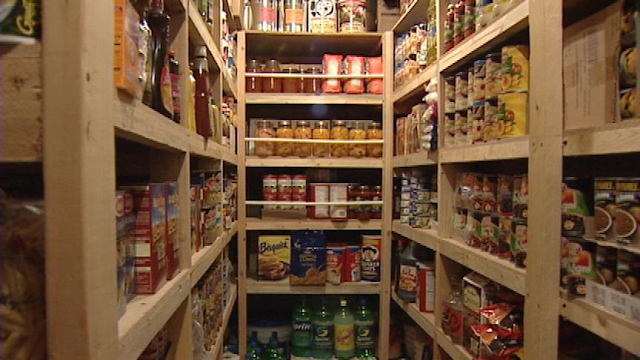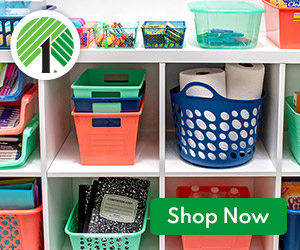Hi and welcome to another Back to Basics 101 article. Today I will address Food Storage basics and how we can best prepare in these turbulent times we live in.
Raising seven children, we didn't always have a lot of extra income; I was also a SAHM for many years. My husband did have a great job with benefits (UPS) that allowed me to be home with the kids, which is what we had discussed prior to marriage. I know that isn't what everyone is able to do or even wants to do, but it is what worked for us. Side note: after our youngest was in school fulltime, I was accepted to nursing school and worked and earned three college degrees over the past 15 years. That's another post, though, lol.
FOOD STORAGE 101: WHERE TO BEGIN?
Photo Credit:
Don't worry, I'm not going to tell you that you have to can your own meat, vegetables, or fruits. I did some canning "back in the day" but I actually prefer to take advantage of sale prices to beef up my food storage. I also frequently freeze produce, such as peaches, berries, or made homemade jam.
WHY FOOD STORAGE?
In this day and age, you daily hear or read talk of transportation delays (trains, trucking), staffing shortages leading to production delays, layoffs, sickness, etc. If you are prepared with the items that you as an individual or as a parent caring for a family will be in need of, you can rest easier. Even in a family emergency (main bread winner is injured or ill and unable to work, layoffs, natural disaster, or even inclement weather such as blizzards (blocking trucks from delivering to the stores), you can take comfort in knowing that you can care for your loved ones.
Being a member of the Church of Jesus Christ of Latter-Day Saints, I learned about food storage years ago when I joined the Church as a teenager. While I haven't always been perfect regarding having a year's worth of food storage, we have always tried to have extra food, water, and health products on-hand.
I know many people who always strive to have extra food and necessities on-hand as it sure can't hurt!
Let's get some tips going!
* START OUT SMALL. You don't have to buy a year's worth of staples (canned goods, flour, seasonings, etc.) all at once (unless you want to and can afford it). A simple way to begin could be buying a few extra cans of vegetables weekly, till you have approx. three months' worth of surplus.
* BUY ITEMS THAT YOUR FAMILY WILL EAT. In an extreme emergency or dire circumstances, one will eat what is on-hand. However, it's best to store foods that have a longer shelf-life and that your family will actually eat. Kids love green beans or tomato soup? Make sure to buy plenty of those. Husband loves peach cobbler? Buy extra cans of peaches. Make sure that you store a variety of nutritious foods for a balanced diet and foods that will store well. Being a lover of chocolate, I do have it on good authority that chocolate chips store well in a cool, dry basement!
* We raise a small flock of backyard chickens so have eggs on-hand!
HAVE STAPLES ON HAND. Have flour, sugar, honey, rice, wheat (need a wheat grinder if you buy this), pasta, oats, and seasonings (iodized salt, etc.) on hand. We buy local honey from various beekeepers in our area. I have found the local honey has a sweeter flavor than store-bought and, if you have seasonal allergies, some believe that local honey can help alleviate some of the symptoms. I looked but found no peer-reviewed evidence of such but here is an informative article. Staples will last over many years, as long as they are kept in the proper environment (cool and dry) and stored properly. Many people use five-gallon buckets to store items such as flour and sugar; these buckets can prevent pests and rodents from accessing your food and also keep the items dry. Often you can order these buckets online or find at local stores--make sure you buy "food grade" buckets and lids (lids are sold separately sometimes).
MEDICATIONS. Don't forget to have basic OTC meds, such as aspirin, ibuprofen, antibiotic creams, bandages, rubbing alcohol, gauze pads, feminine hygiene products, etc. If you are on a prescription medication, make sure you keep your refills current and speak to a pharmacist or provider on possibly getting an extra month's refill to have on-hand.
WHERE TO STORE? You don't have to have an entire room for your food storage. Many ideas for storing include closets, under beds, spare cabinets, basements, etc. Just be sure that the area is dry, not too hot or cold, and protected from pests and insects. Even people with smaller homes and apartments can find space to store extra food items. It might be a good time to declutter and then open up space for food storage!
DON'T FORGET YOUR PETS/ANIMALS! Keep extra canned or dry foods for your dogs, cats, birds, fish, etc.; they're part of the family, too! We have four hens (you can read my post about raising BACKYARD CHICKENS) so need to have extra layer pellets and treats on hand for them. Yes, table scraps are good for many animals but they all have their own specific nutrition needs.
These are very basic ideas to begin a food storage for yourself or your family. I will go further into depth in the next article so make sure you watch for that!
Thanks for stopping by!


%20(1).png)





















.jpg)






Great reminder and information! I want some chickens one of these days.
ReplyDeleteThanks for sharing with us, I'll be featuring you next week when the next To Grandma's house we go link party starts!
ReplyDeleteDonna, thanks so much. You and Tarah have inspired me this morning to streamline some of my storage! And I'm going to get right on it today.
ReplyDeleteGreat insights on food storage! Keeping ingredients fresh and organized really makes a difference in daily life. Just like proper storage ensures quality food, tiger id is a gaming platform and betting site that ensures a secure and well-managed experience for users. It’s all about maintaining reliability, safety, and consistency whether in your kitchen or your favorite online gaming space.
ReplyDeleteKhelraja provides a reliable platform for casino slots online with smooth graphics and easy access. Players can enjoy secure gameplay, fast payouts, and responsive customer support. The betting environment is safe and beginner-friendly. Casino slots online on Khelraja deliver fun, trust, and real entertainment value.
ReplyDelete
ReplyDeleteGrowthwonders is a trusted SEO company helping businesses improve online visibility. Our team works on keyword research, on-page optimization, backlink building, and technical SEO. We create strategies that drive organic traffic and improve rankings. With proven methods and consistent monitoring, Growthwonders supports brands in achieving sustainable digital growth and better search engine performance.